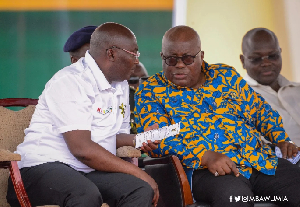By William Dowokpor
Chapter 13 of the 1992 Constitution, deals with finance. It grants Parliament extensive powers in the financial management of the country.
For instance, it is only Parliament that gives approval or otherwise for the imposition of taxes and it is only Parliament that determines the waiver or variation of any taxes imposed on individuals and businesses (Article 174).
It is only Parliament that grants approval for the withdrawal of funds from the Consolidated Fund to meet the expenditures of government through the passage of the Appropriations Act (Article 178).
After authorizing the withdrawal of monies from the Consolidated Fund, Parliament exercises control over the expenditure of such monies through its Public Accounts Committee (PAC).
And for good reasons, the Standing Orders preclude members belonging to the political party in power, controlling and operating Executive power from chairing the Committee. The rationale behind this arrangement is to ensure that the Executive is not a judge and a prosecutor in its own cause.
Besides, having opposition MP(s) chair the Committee is to minimize the possibility of MPs sympathetic to the executive branch of government unduly influencing the parliamentary oversight of finances of the state. This is a fantastic arrangement!
But, while the PAC has been consistent in observing what has unfortunately become an annual ritual of inviting public officials with questions to answer, to appear before it, the public is concerned that little or nothing happens after the rituals. A typical example of promising much but delivering little.
MPs on the other hand, have individually and collectively explained this away, in the fact that they do not have prosecutorial powers and should not contemplate having it as it would offend the principles of separation of powers. If they are right, how do we reconcile the roles of MPs who also serve as ministers of state? What about the Attorney General who doubles as the Executive’s Minister of Justice?
Article 187(6) provides that – “parliament shall debate the report of the Auditor-General and appoint where necessary, in the public interest, a committee to deal with any matters arising from it” The construction I put on this provision is that, this Committee, is imbued with the capacity to see to it that all matters arising from the PAC are dealt with to their logical conclusion, including sponsoring and or facilitating prosecutions to retrieve misappropriated funds.
The non-existence and or inaction of this Committee, in my view are responsible for the widespread public corruption with impunity in Ghana. I do not see any limitations that can be put in the way of this Committee should it move to deal with any public interest matters arising from the recommendations of the PAC that seeks to fight corruption.
On the contrary, I am convinced that the Audit Report Implementation Committees (ARICs) that are supposed to be set up by the various Ministries, Departments and Agencies (MDAs) to implement PAC recommendations are bureaucratic layers deliberately put in the scheme of things to let MDAs get away with the “financial murder” they so regularly commit against the state.
What happened to the internal Audit Departments existing in all the MDAs? If they were not able to implement financial controls to prevent the wrongs from happening in the first place, how can they implement recommendations when the monies have already been looted and shared?
The article 187(6) Committee if set up, well-resourced and motivated would perform wonders including going to court to compel individuals and institutions to obey recommendations of the PAC thereby retrieving stolen monies that the Executive is not able to do for obvious reasons.
Never mind that the A-G is yet to retrieve the GHC51 Million that the Supreme Court has directed it to collect from Agbesi Woyome. On the wings of public interest and willingness on the part of parliament, the article 187(6) Committee will turn things around in the fight against corruption for now, while more fundamental structural reforms such as decoupling the Attorney-General’s Department from the Ministry of Justice in favor of an Independent Public Prosecutor takes shape..
I agree with those who believe the Auditor General has powers to prosecute those found culpable of misappropriating public funds. I also agree that if internal audit procedures were allowed to operate, corruption in the public sector would be prevented. But these positions are difficult or impossible to operate, given that the Auditors’ power relationships with managements, boards and largely the Executive leave them disadvantaged and disempowered in scheme of things.
In the absence of the article 187(6) Committee, the silver bullet for the problem of corruption in Ghana, lies in the establishment of the Office of the Independent Public Prosecutor who should not be a card bearing member of the party in power. That is the most realistic, efficient and effective way to fighting corruption in Ghana. Parliament must take up the challenge and let this happen for once in our democracy.
# # #
Opinions of Thursday, 24 March 2016
Columnist: Dowokpor, William


















